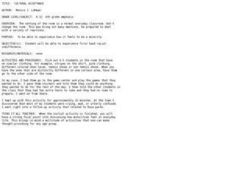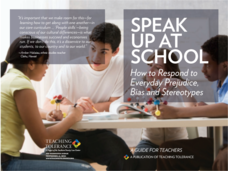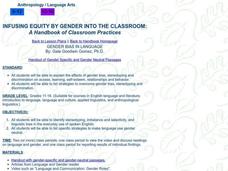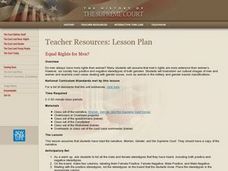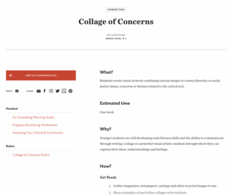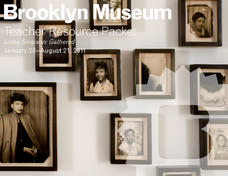Peace Corps
Culture is Like an Iceberg
What influences the way you dress, or celebrate holidays, or connect with your friends? Explore the cultural traits that are not easily seen with an engaging discussion. Using the model of an iceberg, learners place features of culture...
Curated OER
Cultural Issues
Students observe another culture using a provided simulation script and then make assumptions about that culture based on what they witnessed. They will later be debriefed and talk about the assumptions they made that were not accurate.
Curated OER
What Is Culture
Fourth graders investigate the concept of culture. They look into the influences that shape culture and how it effects people and regional areas. Students answer the question of why it is important to study culture to have a better...
Curated OER
Modern Interpretations
To conclude an eight-lesson study of the events that occurred in the early colonial period in Deerfield, Massachussetss, class members evaluate the point of view and bias found in late 19th and early 20th century retellings.
University of the Desert
Do Journalists Shape or Report the News?
Analyze the presence of negative stereotypes and biased reporting in news media, and how this affects one's understanding of other cultures. Learners read newspaper excerpts and quotes from famous personalities to discuss the power of...
Curated OER
Cultural Acceptance
Young scholars are segregated into groups according to their clothing and experience first hand what it feels like to be a minority in everyday life. In this cultural acceptance lesson plan, students experience discrimination first hand....
Curated OER
Conquistadors: Inca Rebellion
Students explore the Incan culture. In this Incan history lesson, students research the rebellions that occured upon the arrival of the Spanish conquistdors. Students write essays regarding the rebellions and whether or not they could...
Curated OER
Stereo What?
Students define words associated with stereotypes. They identify the difference between stereotype, prejudice and discrimination and give examples of each. They discover their own personal biases.
Southern Poverty Law Center
Speak Up at School
When someone says something offensive based on prejudice or a stereotype, it's often difficult to know how to react. A packet on tolerance and standing up for others guides teachers to both learn and instruct members of their class to...
Middle Tennessee State University
John Brown: Hero or Villain?
"Love it or leave it." "You're either for us or against us." Rhetoric and it's polarizing effects are the focus of a lesson that uses John Brown's attack on Harper's Ferry as an exemplar. Groups examine primary source documents,...
Idaho Coalition
The Hunger Games: Gender Empowerment
The odds are in your favor that your pupils will love this lesson that uses The Hunger Games to launch a study of gender empowerment, as well as the influence of social constructs of gender. Groups discuss how Katniss Everdeen and Peeta...
Curated OER
Equal Rights for Men?
Study the issue of gender bias in court cases with a resource that ponders the extent of gender equality. Learners examine cultural images of men and women and examine court cases dealing issues such as women in the military.
Curated OER
Investigating Respect
Students examine prejudice and stereotyping. In this prejudice and stereotyping lesson, students define the words and give examples. They look at pictures of five different people before working in groups to discover their own prejudices...
Teaching Tolerance
Collage of Concerns
A picture can speak louder than words. An interesting lesson introduces the themes of social justice and diversity to young learners by having them create artwork. Scholars create collages from a variety of sources to showcase what...
Curated OER
The Study of the Spanish-Speaking People of Texas: Understanding Primary Sources
Students analyze Russell Lee's photo essay as a sign of segregation in Texas. They consider the differences between primary and secondary sources and how historians use these sources.
Brooklyn Museum
Lorna Simpson: Gathered
Lorna Simpson is a photographer who has put together a collection of photos from the 1950s in order to challenge the idea that primary source documents are objective in their portrayal of history. Learners are introduced to Ms. Simpson's...
School District of Palm Beach County
Timelines
What do BC and AD mean on a timeline? What is the difference between a decade and a century? Here is a nice handout that offers all the foundational knowledge your young historians will need on how to look at historical timelines.
Curated OER
Living Together as One
The ultra-glamorous Muppet, Miss Piggy, launches a study of discrimination and ways to develop a more inclusive community. A series of videos and activities raise awareness of discrimination and journal prompts asks participants to...
Curated OER
Gender Bias in Language
Twelfth graders study the issues between male and females. In this current events instructional activity, 12th graders read an article and answer questions. Students watch a video and write an essay.
Curated OER
History and Human Rights: A Process for Analyzing Events
Students analyze various American History topics which concern human rights. They research the topics and analyze the sources for bias or stereotype. They decide and discuss whether or not any human right were violated in each...
Curated OER
Living Together as One
Young scholars identify examples of discrimination in our country's past and present. They examine how bias is harmful to the community as a whole. They also describe what changes have been made to protect different groups.
Anti-Defamation League
Identity-Based Bullying
What is identity? What is bullying? What is identity-based bullying? After discussing these questions as a class, pupils engage in partner discussions before participating in a small group activity to act out bullying scenarios. Then,...
Curated OER
Eloquent Words
Logan’s Lament, a speech delivered by Mingo Chief Logan in 1774, provides pupils with an opportunity to not only study the historical events surrounding the battle between Native Americans and the Europeans for the West Virginia...







